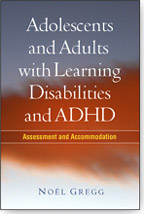 by Noel Gregg
by Noel Gregg
Leading expert Noel Gregg provides clear guidance on how to conduct and document evidence-based assessments and select appropriate instructional and testing accommodations.
Full Description:
Most of the literature on learning disabilities and attention-deficit/hyperactivity disorder (ADHD) focuses on the needs of elementary-age children, but older students with these conditions also require significant support. Comprehensive and authoritative, this book helps educators and clinicians navigate the maze of laws, policies, and scientific research relating to diagnostic and intervention decision making for adolescents and adults. Leading expert Noel Gregg provides clear guidance on how to conduct and document evidence-based assessments and select appropriate instructional and testing accommodations. Featuring helpful case vignettes, decision-making flowcharts, and coverage of the latest assistive technologies, the book gives special attention to supporting students during the crucial transition from high school to higher education or vocational settings. "Written by an expert in the field, this book is coherent and insightful. Gregg's coverage of up-to-date research is comprehensive, and she has an exceptional ability to identify and describe practical applications. The book meets a tremendous need."
-H. Lee Swanson, PhD, Distinguished Professor of Educational Psychology and Peloy Chair, University of California, Riverside "An exceptionally well-written, detailed, authoritative, and science-based review of appropriate educational accommodations for teens and adults with ADHD and/or LD, and the documentation needed to obtain them. It is the best contemporary treatment of this topic available. The book is rich with useful recommendations pertaining to multiple aspects of individual functioning, including cognitive, social, emotional, behavioral, and academic domains. Highly readable, instructive, and punctuated with informative case examples, this book should prove beneficial to clinicians, educators, and graduate students."
-Russell A. Barkley, PhD, ABPP, Department of Psychiatry, Medical University of South Carolina and State University of New York Upstate Medical University at Syracuse Noel Gregg, PhD, Department of Psychology and Department of Communication Sciences and Special Education, University of Georgia, Athens, Georgia
318 Pages, 6 x 9
1. Why Are Accommodations Important?
2. Documentation for Accommodation Access
3. Broad and Specific Cognitive Processing
4. Social, Emotional, and Behavioral Assessment and Accommodation
5. Reading Assessment and Accommodation
6. Writing Assessment and Accommodation
7. Different Symbol Systems: Mathematics, Science, and Second Languages
8. Accommodations on Large-Scale Assessments
Stock: Preorder Publish Feb 2009
|